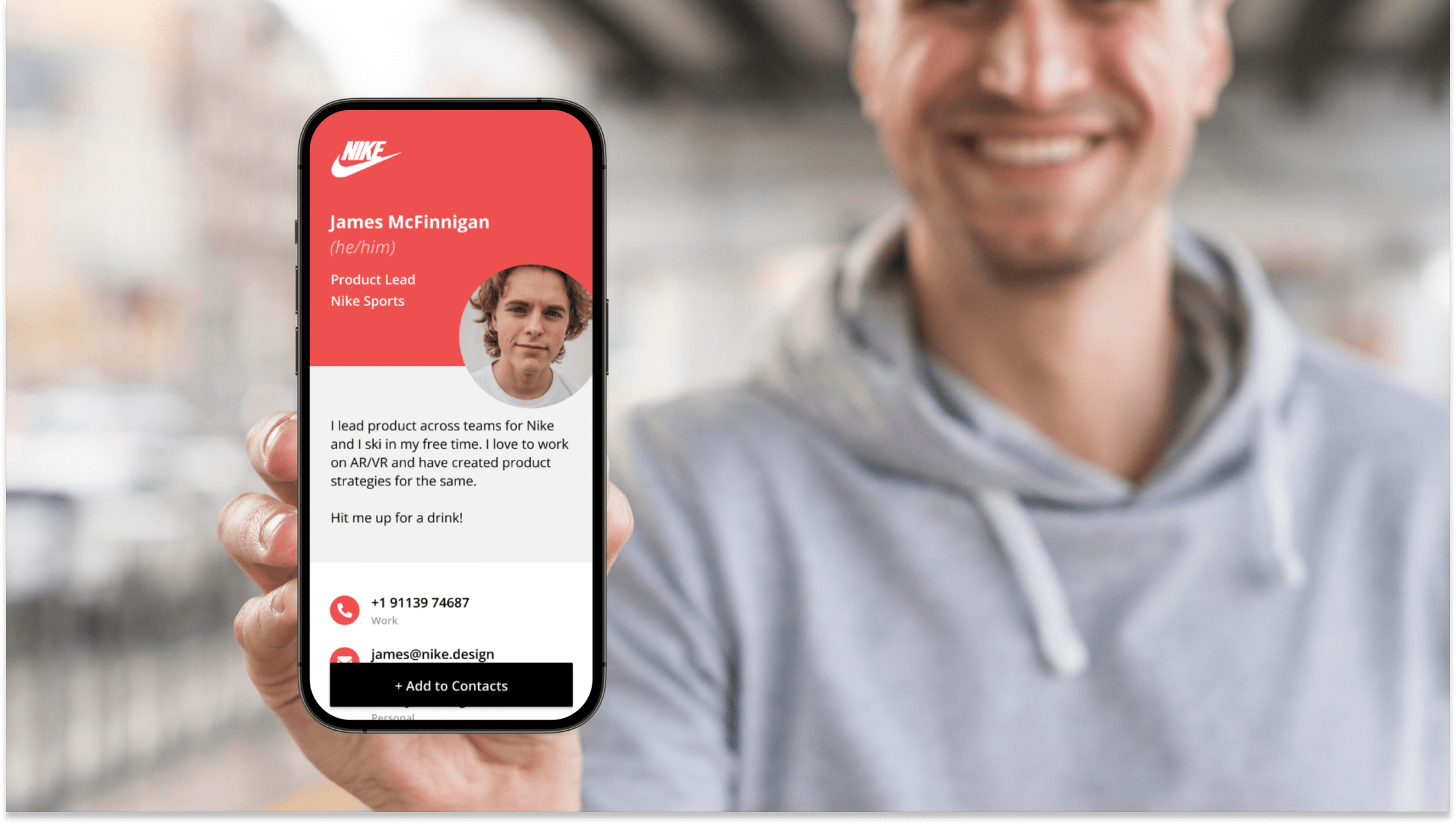Your personal brand isn’t just about what you do. It’s also about how people remember you. In today’s digital-first world, your online presence often speaks before you do. Whether a hiring manager checking your LinkedIn or a client Googling your name, your brand lives beyond in-person interactions.
Here’s the challenge: How do you make lasting, meaningful connections in an era of short attention spans?
That’s where digital business cards come in. More than just a way to share contact details, they’re a dynamic extension of your personal brand.





Let’s explore how digital business cards influence personal branding and ensure that your first impression isn’t just seen—it’s remembered.
Table of contents
- What is personal branding, and why it matters more than ever?
- How can digital business cards help with personal branding?
- Why personal branding is vital at the organizational level (& how digital business cards help)
- Best practices for digital business cards in personal branding
- Frequently asked questions
What is personal branding, and why it matters more than ever?
Personal branding is crafting and communicating your unique value proposition to the world. It’s about defining who you are, what you stand for, and what makes you stand out. Think of it as your professional reputation amplified.
Your brand is your digital fingerprint, your calling card in a sea of faces and resumes. It sets you apart in a competitive job market, helps you attract clients, and builds influence in your industry.
First impressions matter, both online and offline. A strong personal brand ensures that the first encounter is positive and memorable. It’s about creating a consistent and authentic image across all platforms, from your LinkedIn profile to your email signature.
Learn from the best
Luvvie Ajayi (Speaker and thought leader) built her brand by blending humor, activism, and storytelling across multiple platforms. Her authenticity has made her a sought-after keynote speaker and best-selling author.
How can digital business cards help with personal branding?
Personal branding is how people perceive and remember you, your expertise, values, and professional identity. A digital business card is a powerful tool that ensures your brand is consistent, memorable, and impactful across every interaction. Unlike a traditional paper card, it helps you showcase your unique story, expertise, and credibility in a way that aligns with your overall brand identity. With interactive features like links, videos, and social profiles, it creates a dynamic first impression and makes networking more effective.
Here’s how a digital business card strengthens your personal brand:

1. Brand consistency across every platform
Your personal brand should look and feel the same everywhere—from LinkedIn to your website to your email signature. A digital business card helps extend this branding into physical interactions, ensuring every connection sees the same professional identity.
💡Example: A thought leader in marketing and strategy uses the same profile photo, tagline, and brand colors across LinkedIn, their blog, and their digital business card. Whether someone scans their QR code or visits their profile, they get the same cohesive brand experience.
2. First impressions that stick
People judge your brand in seconds. A well-designed digital business card helps you control that first impression by offering an interactive, sleek, and modern way to introduce yourself.
💡Example: A startup founder attends an investor meetup, and instead of handing out a plain business card, they share a QR code linking to their digital business card, which includes a personal introduction video and links to their latest press features. This immediately sets them apart and reinforces their credibility.
3. Telling your brand story, not just your contact info
A personal brand is more than a name and job title; it’s your story, expertise, and unique value. A digital business card allows you to share:
✔ A bio or personal statement about your expertise
✔ Portfolio links to showcase your work
✔ Social media handles to engage with your audience
💡Example: A UX designer uses their digital business card to not only share their LinkedIn and email but also to link directly to their Behance portfolio and a case study on their latest project, demonstrating their skills instead of just stating them.
4. Building authority & thought leadership
Personal branding isn’t just about being recognized—it’s about being respected in your industry. A digital business card helps establish authority and credibility by linking to:
✔ Articles you’ve written
✔ Podcasts or interviews you’ve been featured in
✔ Your latest achievements or certifications
💡Example: A cybersecurity expert shares a digital business card with a direct link to their blog on industry trends, reinforcing their expertise beyond just a job title.
Why personal branding is vital for various working professionals (& how digital business cards help)
Personal branding isn’t just for entrepreneurs and influencers—it’s also a powerful strategy for every profession. From executives shaping industry narratives to sales teams driving conversions, every profession benefits from strategic personal branding.
Digital business cards make it easier to share expertise, showcase credibility, and connect effortlessly—whether in person, online, or across social media.
Let’s break it down by profession.
1. Corporate leaders and executives
A company’s leadership plays a crucial role in shaping public perception. Executives with strong personal brands humanize the company, making it more relatable and trustworthy.
💡Example: Would you trust a corporate press release or a company executive actively sharing insights on LinkedIn? Thought leaders such as Satya Nadella (Microsoft) and Sara Blakely (Spanx) don’t just represent their companies—they build trust through personal engagement and expertise.
✅ How digital business cards help:
✔ Showcase keynote speeches & industry insights
✔ Include high-profile media mentions & leadership blogs
✔ Link to LinkedIn profiles and networking calendars
🚀Pro tip: Create custom C-level digital business cards featuring speaking engagements, interviews, and leadership publications to establish authority.
2. Sales professionals
Sales professionals act as the face of the company. When they have a strong personal brand, they create more trust and credibility with potential clients. Studies show that employee-shared content gets 8x more engagement than corporate marketing.
💡Example: Dell launched its “Social Media & Community University (SMaC U)” to train employees on social media best practices. Over 16,500 Dell employees became active brand advocates, leading to 6x more engagements on Dell-related content. This initiative boosted brand awareness, lead generation, and customer trust.
✅ How digital business cards help:
✔ Include product demo requests & case study links
✔ Share company blogs & thought leadership articles
✔ Provide direct contact options for prospects
🚀Pro tip: Create department-specific digital business cards. A sales professional’s digital business card could include demo links, while a marketing leader’s card could link to strategic insights.
3. Lawyers
Clients need to trust their legal representation. Lawyers with strong personal brands build credibility through thought leadership, case successes, and industry engagement.
When executives have strong personal brands, they position the company as a trusted industry leader, attracting media opportunities, partnerships, and top talent.
💡Example: Amal Clooney, an internationally recognized human rights lawyer, has built a personal brand that extends beyond her legal practice. Through high-profile cases and advocacy, she has established credibility, attracting media coverage and strengthening the reputation of her law firm, Clooney Foundation for Justice.
✅ How digital business cards help:
✔ Showcase credentials, awards, and case studies
✔ Provide direct links to legal articles & advisory blogs
✔ Include easy consultation booking links
🚀Pro tip: Legal professionals should use branded digital business cards featuring their firm’s compliance pages and client success stories to reinforce trust.
4. Human resource & talent acquisition
Top candidates and business partners evaluate a company’s culture, leadership, and employees before making decisions. Top candidates and potential business partners evaluate a company’s leadership and employees before making decisions. A strong personal brand within the organization makes the company more attractive to high-caliber professionals and strategic alliances.
💡Example: Tech companies like Microsoft encourage employees to build their personal brands by speaking at conferences, publishing thought leadership pieces, and engaging on LinkedIn—making them more appealing to job seekers.
✅ How digital business cards help:
✔ Direct links to job openings & company culture pages
✔ Referral programs & talent acquisition forms
✔ Networking tools for HR teams & hiring managers
🚀Pro tip: Equip HR professionals with branded digital business cards to simplify recruitment by providing easy access to job opportunities and referrals.
5. Customer success
Customers don’t just buy products or services—they buy experiences and relationships. A strong personal connection with a brand fosters trust, loyalty, and long-term engagement.
💡Example: Apple has consistently ranked at the top for brand loyalty, mainly due to its focus on creating personal connections with its customers. The company’s commitment to quality, innovation, and a smooth user experience has cultivated a dedicated customer base. Studies have shown that many current iPhone users plan on purchasing another iPhone in the future, demonstrating strong customer retention.
✅ How digital business cards help:
A digital business card makes it easy to maintain connections by offering:
✔ Direct access to customer support (WhatsApp, Calendly, email)
✔ Links to help desks, FAQs, and product guides
✔ Quick ways to schedule follow-ups & check-ins
🚀Pro tip:Provide customer success teams with support-driven digital business cards featuring direct assistance links, making it effortless for clients to get the help they need when they need it.
Best practices for digital business cards in personal branding
Your digital business card is a powerful tool to establish your brand identity. Here’s how you can use it effectively:

1. Keep it professional yet personal
Why?
Your digital business card should reflect your industry and personality while maintaining a polished and trustworthy impression.
How?
- Use a high-quality headshot that matches your LinkedIn or professional profiles.
- Choose brand-aligned colors and fonts for consistency.
- Write a concise yet compelling tagline that summarizes what you do.
⚡See it in action:
Corporate lawyer → Opts for a sleek, minimalist layout with a QR Code to their LinkedIn profile.
2. Include more than just contact information
Why?
A digital business card is a mini-hub for your professional presence—not just a contact card.
How?
- Add links to your website, portfolio, or key social media profiles.
- Include a short bio or elevator pitch explaining what you do.
- Offer downloadable resources (e.g., whitepapers, case studies).
⚡See it in action:
Tech sales executive → Links to a product demo video or pricing page.
3. Make it easy to share & save
Why?
Networking is all about quick and seamless interactions. A digital business card should be easy to share without friction.
How?
- Use one-tap sharing via NFC or QR Code.
- Offer multiple formats (email signature, website embed, mobile wallet).
- Ensure contacts can save your details in a single tap.
⚡See it in action:
Event planner → Uses a QR Code on event materials for instant networking.
4. Optimize for mobile & cross-device accessibility
Why?
Most people will view your card on a mobile device, so it must be responsive and user-friendly.
How?
- Ensure your digital business card is mobile-optimized (fast-loading, responsive).
- Test on multiple devices and browsers.
- Embed it in email signatures, social profiles, and messaging apps.
⚡See it in action:
IT professional → Ensures the digital business card loads quickly on mobile with lightweight graphics.
5. Update regularly & track engagement
Why?
Your network evolves—and so should your digital business card.
How?
- Update job titles, services, or contact details as needed.
- Track how many people view and save your card.
- Analyze which links get the most clicks.
⚡See it in action:
Fitness coach → Analyzes which workout plans get the most downloads.
⚡Pro tip: Don’t just count scans—track real engagement! Uniqode’s analytics help you see how people interact with your digital business card so you can refine your personal brand and leave a lasting impact.

- Card view: Learn how effective your distribution strategies and promotional efforts are.
- Contact saves:Identify warm leads who are actively interested in your service.
- Unique users: Assess the breadth of your client base to target your outreach efforts more effectively.
- Card views by device: Understand the effectiveness of your optimization for different platforms or screen sizes.
- Card views by time: Strategically schedule follow-ups or communication campaigns.
- Card views by city: Tailor your communication strategies based on geographical location.
- Card views by location: Get granular insights into audience demographics and preferences.
6. Ensure to include a strong call-to-action
Why?
A clear CTA guides your contacts on the next step after receiving your card.
How?
- Use action-oriented language (e.g., “Book a Call,” “View My Portfolio”).
- Position your CTA prominently.
- Offer multiple ways to engage (email, chat, booking link).
⚡See it in action:
Financial advisor → CTA: “Schedule a Free Consultation” (links to Calendly).
7. Use QR Codes for maximum impact
Why?
A QR Code bridges the gap between physical and digital networking.
How?
- Generate a dynamic QR Code that updates without reprinting.
- Place QR Codes on resumes, presentations, and marketing materials.
- Track QR Code scans to measure networking success.
⚡See it in action:
Retail Business Owner → Places a QR Code at the checkout counter for loyalty sign-ups.
Elevate your brand and make it unforgettable with Uniqode!
We have understood that having a good personal brand is not just a luxury but a necessity. Digital business cards streamline networking, keep your brand dynamic, and make sharing your story effortless. With Uniqode’s digital business cards, you can take control of your first impression and ensure it’s remembered for all the right reasons.

Frequently asked questions
1. How can a digital business card help me with my personal branding?
A digital business card can be a powerful tool for personal branding in several ways:
- First impressions: A well-designed digital business card can make a strong first impression, showcasing your professionalism and attention to detail.
- Convenience: Digital business cards are easy to share and save, making it simple for people to connect with you.
- Eco-friendly: Digital business cards eliminate the need for paper cards, reducing waste and promoting sustainability.
- Branding consistency: With a digital business card, you can maintain consistent branding across all your online platforms.
- Up-to-date information: You can easily update your digital business card with the latest information, ensuring accuracy and relevance.
2. What are some tips for designing a digital business card for personal branding?
- Visual appeal: Use a professional design that reflects your personal brand and is visually appealing.
- Essential information: Include your name, title, contact information, and links to your website and social media profiles.
- Interactive elements: Consider adding interactive elements like a QR code or clickable links to make it easy for people to connect with you.
- Mobile-friendly: Ensure your digital business card is optimized for viewing on mobile devices.
Sukanya is a Content Marketer at Uniqode and a former journalist who fuses newsroom curiosity with SEO-savvy storytelling to help brands grow online. She’s on a mission to demystify digital business cards, digging deep into data, trends, and user behavior to spotlight how they transform how we network and generate leads. Her content doesn’t just inform—it equips. Outside the digital realm, she’s either rescuing animals, getting lost in a plot twist, whipping up kitchen experiments, or chasing stories worth telling.
Related Posts
14 day free trial of the QR platform














